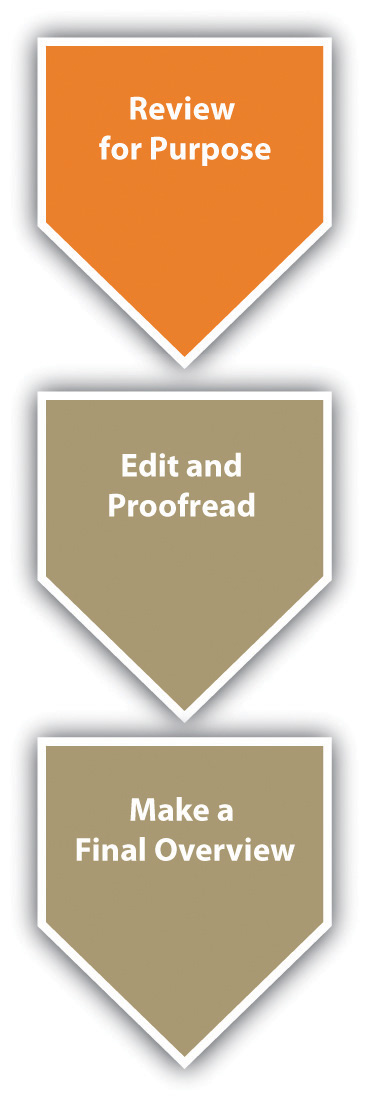28 Revision Strategies
Dr. Sandi Van Lieu and Dr. Karen Palmer

Revision
Revision is an important part of the writing process. Our first draft should never be our final draft. There is always room for improvement. A published author of a New York Times best-selling novel can still find opportunities to make the novel better.
It’s important to note that revision concerns making changes to what is said and how it is said. It includes adding or deleting paragraphs, changing the organization of points in the paper, adding more support, clarifying ideas, etc. Revision is not a matter of fixing spelling errors and adding punctuation marks. Instead, revision is where an author refines the ideas to ensure that the purpose of the message is fulfilled.
In addition to taking note of comments from peer review, students should consider taking their papers to a Writing Lab or Learning Center on their campus for additional feedback. Reading the paper out loud to a friend or a family member can also help students find areas that could be improved.
Revise Purposefully
You should read through your first complete draft once you have finished it and carefully reconsider all aspects of your essay. As you review, keep in mind that your paper’s purpose has to be clear to others, not just to you. Try to read through your paper from the point of view of a member of your targeted audience who is reading your paper for the first time. Make sure you have clarified the points your audience will need to have clarified and that you haven’t over-clarified the points your audience will already completely understand.

Revisiting Your Statement of Purpose
Self-questioning is a useful tool when you are in the reviewing process. As you begin the process of revision, reexamine the six elements of the rhetorical situation that made up your original statement of purpose (voice, audience, message, tone, attitude, and reception):
- Voice: Does it sound like a real human being wrote this draft? Does my introduction project a clear sense of who I am? Honestly, would someone other than my paid instructor or assigned peer(s) read beyond the first paragraph of this essay?
- Audience: Does my writing draw in a specific set of readers with a catchy hook? Do I address the same audience throughout the essay? If I don’t, am I being intentional about shifting from one audience to another?
- Message: Are my main points strong and clear? Do I have ample support for each of them? Do my supporting details clearly support my main points?
- Tone: Am I using the proper tone given my audience? Is my language too casual or not professional enough? Or is it needlessly formal and stiff sounding? Does my tone stay consistent throughout the draft?
- Attitude: Will my organization make sense to another reader? Does my stance toward the topic stay consistent throughout the draft? If it doesn’t, do I explain the cause of the transformation in my attitude?
- Reception: Is my goal or intent for writing clear? How is this essay likely to be received? What kind of motivation, ideas, or emotions will this draft draw out of my readers? What will my readers do, think, or feel immediately after finishing this essay?
Additional Revision Strategies
As you read through your paper look for:
- Unity
- Does everything refer back to main point?
- Does each topic sentence refer to the thesis?
- Does each sentence in each body paragraph refer back to the topic sentence?
- Do I have enough details, examples, and other forms of support?
- Is each example followed by at least one supporting detail?
- Are all points connected to form a whole?
- Are transitions used to move from one idea to the next?
Revision Tips
- Take a break from your draft before attempting to revise.
- Read your draft out loud and listen to your words.
- Imagine yourself as your reader.
- Look for consistent problem areas.
- Get feedback from peers.
- Get help from a tutor at your college’s Learning Center or Writing Lab (usually free!)
Exercise 1
1. Find multiple drafts of an essay you have recently completed. Write a descriptive outline of at least two distinct drafts you wrote during the process.
2. For a recently completed essay, discuss how at least one element of your statement of purpose (voice, audience, message, tone, attitude, or reception) changed over the course of the writing process.
Exercise 2
1. With your writing group, develop five questions you think everyone in your class should have to answer about their essay drafts before submitting them for evaluation from a peer or your instructor.
Attributions
- “Revision” from The Worry Free Writer and licensed under CC-BY NC SA.
- Content from “Chapter 8: Revising” licensed under CC BY NC SA.
- Additional revision strategies and tips created by Dr. Sandi Van Lieu and licensed under CC BY NC SA.
